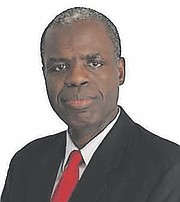• ‘Economy better off’ than if sitting in reserves
• Banks: $100m ‘turnaround’ on currency dealings
• Foreign exchange purchases increase by 10%
By NEIL HARTNELL
Tribune Business Editor
nhartnell@tribunemedia.net
The Central Bank’s governor yesterday urged Dorian-ravaged businesses and homeowners to draw down on “at least $200m” in unused reinsurance funds to finance rebuilding, adding: “The economy will be better off.”
John Rolle, speaking at the regulator’s 2021 second quarter economic briefing, said it had “no intent or desire” for these monies to remain in The Bahamas’ external reserves even though they had helped to boost the country’s foreign currency holdings to $2.6bn at mid-July.
Revealing that Dorian-related insurance claims collectively generated around $500m in foreign currency-related reinsurance inflows into The Bahamas, Mr Rolle said: “In particular, there remains important accumulations in the reserves from reinsurance receipts from Hurricane Dorian. The economy would benefit more from having those resources spent at a faster pace on rebuilding....
“There’s no intent or desire for those funds to sit unused. We’d like to see the economy benefit from a faster pace of rebuilding, which means those reserves get used up. To the extent there are still considerable amounts of funds intended for or expected to be put into the repair of damaged properties in The Bahamas, we’re better off seeing those funds used up in rebuilding and not seeing them in the reserves but payments for goods and services that continue to rebuild.”
Estimating just how much reinsurance money remains in The Bahamas’ external reserves, Mr Rolle added: “After the hurricane, it’s estimated that the reinsurance receipts were well in excess of half-a-billion dollars ($500m). Today, from what we’ve seen, we estimate there’s at least $200m in funds that we have in The Bahamas that have not been used. We’d be better off seeing those funds spent on rebuilding.”
Still, the improvement in foreign currency inflows enjoyed over the 2021 first half as tourism rebounded and the wider economy opened meant Bahamian commercial banks had seen “a complete turnaround” in their currency exchange dealings compared to the same period last year which was hit by COVID-related lockdowns and restrictions.
Mr Rolle said this had resulted in “a differential in excess of $100m” compared to the 2020 first half, as “on a net basis” the commercial banks purchased more foreign currency from clients than they sold to them. This, the governor added, was a sign that the private sector is now “making a net contribution” to the external reserves build-up via revived foreign currency inflows related to tourism.
“As income is returned we’re seeing the spending pick up,” Mr Rolle added. “That’s why we see more foreign exchange being purchased from the banks to make payments abroad. What we did see during the first half of the year is a complete turnaround of the situation with the commercial banks, meaning that on a net basis they actually took on more foreign exchange from customers than they sold to customers.
“That’s an indication of businesses selling more foreign currency to the banks on a net basis. This year the banks purchased foreign currency from the public. Last year, between January and June, it was a small net sale of foreign exchange to customers as opposed to an intake.
“The differential from this year compared to last year is in excess of $100m. That is an indication of the extent to which the situation for banks has been reversed relative to the intake from customers.”
The Central Bank chief added that net foreign exchange inflows from the government over the 2021 first half were “not drastically different” when compared to the same period in 2020, and he said: “The additional difference this year in terms of the outcome; the private sector is now making a net contribution to the accumulation of reserves.”
Mr Rolle said tourism’s “seasonality”, with the industry’s quietest periods traditionally stretching from September through October, meant that foreign currency outflows usually exceed inflows during the second half. As a result, a draw down on the external reserves is forecast over this period “but that will not be at a level that creates concern”.
He reiterated: “In the present environment, with bank credit expansion not placing pressures on foreign exchange usage, and the Government still required to finance an important share of the deficit in foreign currency, the external reserves have increased to near $2.6bn as at mid-July. These balances are expected to decrease over the remainder of 2021, but not to any level that would cause concern.
“What’s missing from the picture right now is credit expansion, which is an added stimulus for financing and spending abroad. To the extent that is not creating any pressure on the use of the reserves, the economy is operating largely on income to some extent. So on a net basis we’re not seeing heavy pressure for a draw down in reserves.”
Mr Rolle concluded: “The first-half tourism improvement was evident in strengthening foreign currency inflows through the banking system. In particular, commercial banks’ foreign currency purchases rose by 10 percent compared to 2020. With fewer restrictions on local commerce and travel, the sale of foreign currency for travel and other uses outside The Bahamas strengthened by approximately 7 percent.”





Comments
rodentos 4 years, 6 months ago
where can I get the money?
TalRussell 4 years, 6 months ago
Comrade Gov. John, pray do tell, exactly, where Abacoians can goeth access this such long-kept secret from them's, stash accumulation $200 million, yes?
The_Oracle 4 years, 6 months ago
Is he stupid? How does one "draw down" on unclaimed or non claimed insurance money?
TalRussell 4 years, 6 months ago
Oh yes, fewer numbers know, exactly, how this stash $200+ millions of dollars of monies came about and are kept well hidden away from Abacoians, yes?
Sign in to comment
OpenID